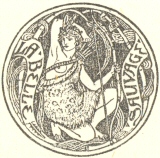Transcribed from the 1889 Cassell and Company edition by LesBowler.
CASSELL’S NATIONAL LIBRARY.
LIVES
OF THE
English Poets
Gay Thomson Young Gray etc.
BY
SAMUEL JOHNSON, LL.D.
CASSELL & COMPANY, Limited:
LONDON, PARIS,NEW YORK &MELBOURNE.
1889.
p.5INTRODUCTION.
This volume contains a record oftwenty lives, of which only one—that of EdwardYoung—is treated at length. It completes our editionof Johnson’s Lives of the Poets, from which a few only ofthe briefest and least important have been omitted.
The eldest of the Poets here discussed were Samuel Garth,Charles Montague (Lord Halifax), and William King, who were bornwithin the years 1660–63. Next in age wereAddison’s friend Ambrose Philips, and Nicholas Rowe thedramatist, who was also the first editor of Shakespeare’splays after the four folios had appeared. Ambrose Philipsand Rowe were born in 1671 and 1673, and Isaac Watts in1674. Thomas Parnell, born in 1679, would follow next,nearly of like age with Young, whose birth-year was 1681. Pope’s friend John Gay was of Pope’s age, born in1688, two years later than Addison’s friend Thomas Tickell,who was born in 1686. Next in the course of years came, in1692, William Somerville, the author of “TheChace.” John Dyer, who wrote “GrongarHill,” and James Thomson, who wrote the“Seasons,” were both born in the year 1700. They were two of three poets—Allan Ramsay, thethird—who, almost at the same time, wrote verse instinctwith a fresh sense of outward Nature which was hardly to be foundin other writers of that day. David Mallet, Thomson’scollege-friend and friend of after-years—who shares withThomson the curiosity of critics who would decide which of themwrote “Rule Britannia”—was of Thomson’sage.
The other writers of whose lives Johnson here gives his notewere men born in the beginning of the eighteenth century: GilbertWest, the translator of Pindar, in 1706; George Lyttelton, in1709. William Shenstone, whose sense of Nature, althoughtrue, was mixed with the conventions of his time, and who onceasked a noble friend to open a waterfall in the garden upon whichthe poet spent his little patrimony, was born in 1714; ThomasGray, in 1716; William Collins, in 1720; and Mark Akenside, in1721. In Collins, while he lived with loss of reason,Johnson, who had fears for himself, took pathetic interest. Akenside could not interest him much. Akenside made hismark when young with “The Pleasures of Imagination,”a good poem, according to the fashion of the time, when read withdue consideration as a young man’s first vent

